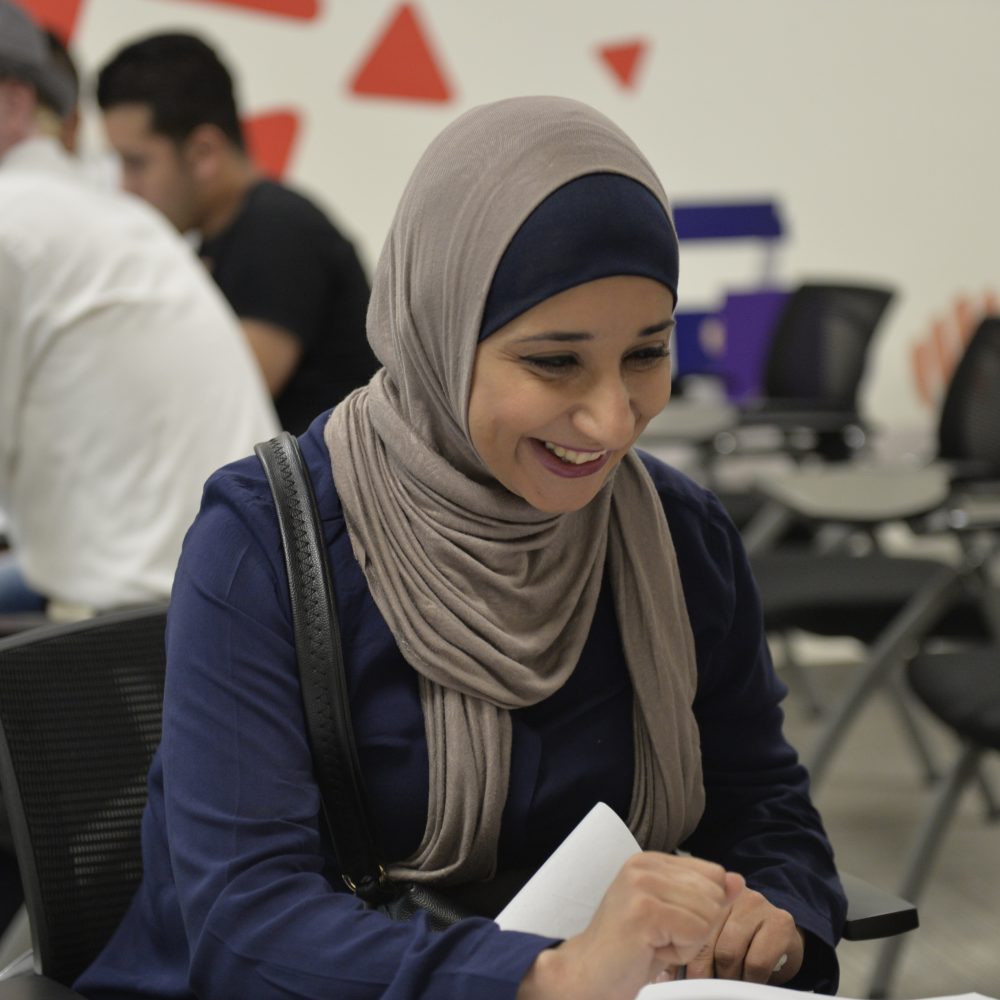Context and policy overview
High levels of youth unemployment have a huge impact on communities’ economic growth and societal development around the world. Indeed, youth unemployment leads to political and labour-market instability as well as social exclusion.[1]
Jordan has one of the highest unemployment rates in the Middle East and North Africa, as well as one of the largest youth populations, with 63 per cent of the country’s inhabitants under the age of 30.[2] The country’s unemployment rate surged to 24.7 per cent in 2020 due to the impact of the Covid-19 pandemic, the highest rate recorded since 2005.[3]
Young Jordanians are disproportionally affected by unemployment. It is estimated that more than one-third of the country’s youth is unemployed and that 39 per cent of young people aged 15-29 are not in education, employment or training.[4] Gender disparities persist, with young women particularly vulnerable to unemployment; female youth unemployment is almost triple that of young men.[5]
Supporting employability, particularly among youth and marginalised groups, is a key priority of the EBRD’s operations in Jordan. The Bank’s inclusion mandate prioritises the provision of access to education and skills development for disadvantaged groups, including refugees, women, youth and people with disabilities, to support their employability. Importantly, the Bank seeks to provide quality skills development programmes that align with labour-market demand.
In line with these objectives, the Bank helped to set up the Abdali Mall Recruitment and Training Centre (AMRTC). The centre was designed to provide skills training for young people in the retail, hospitality and tourism sectors, to fill positions required by tenants of the Abdali Mall and the wider Abdali region, including international restaurants and hotel chains.
Implementation
In 2015, the EBRD provided a senior loan of US$ 80 million to the Abdali Urban Regeneration Project [6] to support the development and operationalisation of a food, retail and entertainment centre, namely, the Abdali Mall.
To promote gender and economic inclusion in the Abdali Mall, the EBRD supported the establishment of a training centre for youth to acquire the skills they needed to seek employment in the retail and hospitality sectors. Thus, the AMRTC opened in October 2016 as an educational training facility, housed in the Mall itself.
The Bank has played a pivotal role in setting up the AMRTC alongside the Abdali Mall team, including the design and delivery of curricula, training of trainers and high-quality training programmes. This process was made possible through funding from the United Kingdom’s Foreign, Commonwealth and Development Office (FCDO).
Education for Employment Jordan (EFE-Jordan) was selected to operate the AMRTC for its first five years. In its capacity as the operator, EFE-Jordan has hosted technical and soft-skills training and job fairs for students at the AMRTC.
The training centre provides training and career guidance in partnership with local schools and job centres for young Jordanians and Syrians, with a key focus on women. The AMRTC continues to host hundreds of new students each year to complete technical training and soft-skills workshops and to attend career guidance services, including job fairs.
The beneficiaries are between 18 and 40 and residents of Amman. The AMRTC seeks out trainees who are actively searching for employment in the retail and hospitality sectors. Candidates are also screened based on their level of education, previous education and employment, and their motivation for completing the training.
Training programmes at the AMRTC are full-time courses over 6-10 weeks (depending on the topic), with a blend of classroom and field-based components, as well as technical and soft skills. Certification is awarded to participants upon successful completion of the training programme, including full attendance.
The AMRTC seeks to address the significant skills mismatch and high unemployment rates among Jordanian youth by providing access to market-relevant training to improve employability.
Over the past five years, EFE-Jordan and the AMRTC have successfully mobilised funding from the private sector and donors to continue their training offering. More than 1,700 young people have graduated from the AMRTC, 230 of whom were financed by the FCDO.
Barriers and critical success factors
Youth unemployment is particularly high in Jordan. A significant contributing factor to this is the mismatch between qualifications and market demand for skilled employees. Upon graduation from higher education, young people are not well equipped with the technical and soft skills necessary for employment.
Skills-building programmes need to be relevant to the national market to facilitate the transition from education to employment.[7] The success of the AMRTC shows how addressing the skills mismatch by providing market-relevant training is essential to support young people entering the workforce.
The private sector should also be heavily involved in designing skills and targeted programmes to promote youth inclusion, as well as to ensure the relevance of skills offered and beneficial employment outcomes in the relevant sectors of the workforce. The AMRTC is represented on the Sector Skills Council on Hospitality and Tourism, which liaises between private-sector employers and training providers on skills governance.
It is also worth noting that unemployment rates among Jordanian women are particularly high. Despite the fact that women are generally better educated than men,[8] the World Economic Forum ranked Jordan 131st out of 156 countries in its 2021 Global Gender Gap Index, with a labour-force participation rate of 15 per cent for women and 67 per cent for men.[9]
Many factors affect women’s access to employment, including a lack of transport infrastructure, socio-cultural attitudes associated with women’s employment outside the home and in service-industry jobs, as well as general attitudes towards technical and vocational education and training (TVET) and vocational employment.
Discriminatory hiring practices against women and Syrian refugees presents another barrier to the project. In this context, social-cultural norms and attitudes play a crucial role in defining levels of women’s employment in Jordan and their decision to work.
Employers are also less likely to hire female employees due to similar socio-cultural attitudes and concerns about childcare or motherhood.[10]
This project tackles such challenges through awareness-raising sessions, including legal awareness, so that trainees know their rights as they prepare to enter the workforce. These sessions also discuss equal opportunities and safe working conditions for all, regardless of gender.
Moreover, the AMRTC has supported female participants by offering dedicated training on home-based businesses and the retail sector to support their entry into the workforce, thus helping to make it socially acceptable for women to work in those occupations.
The AMRTC has sought to address many of the challenges that Jordan’s youth, including Syrian refugees and women, experience when it comes to entering the workforce. It has adopted the following approaches to support their transition into education and subsequently employment:
- The AMRTC adopts training selection criteria in order to ensure that selected beneficiaries are not currently in education or employment, have no open applications for resettlement in a third country and are interested in seeking full-time employment in the hospitality and retail sectors. These selection criteria ensure that training candidates are committed to completing the training programme and searching for and securing employment in their new field. For instance, selection criteria to screen women include their comfort in using public transport to
- All trainees receive a transport stipend to support their access to the training centre.
- All trainees participate in legal awareness workshops that address common questions and misconceptions about formal employment, including the rights and responsibilities of both employees and employers. These workshops have been especially beneficial to Syrian refugees, as they help address common misconceptions about obtaining a work permit.
- The AMRTC delivers a blended curriculum of technical and soft-skills training to ensure graduates have market-relevant skills for employment. Soft-skills training includes English language, customer service and communication skills.
- The AMRTC liaises directly with private-sector employers, including the tenants of the Abdali Mall and the wider Abdali area, to match training with job placement. This ensures that trainees are equipped with the skills employers are looking for and that graduates, especially women and Syrian refugees, have access to suitable placement opportunities.
Despite the barriers, the Abdali Mall project has been a resounding success, highlighting the indispensable role of women, refugees and youth in the economic development of Jordan.
Results and lessons learned
The AMRTC was designed to support youth employability in Jordan, including for Syrian refugees, in the retail and hospitality sectors.
Over the past five years, more than 1,700 young people have graduated from the centre’s market-relevant and blended technical and soft-skills training programmes, including retail salespeople, waiters, baristas and hospitality workers.
- More than 60 per cent of graduates are women.
- More than 25 per cent of graduates are Syrian refugees.
- Graduates report better access to formal employment. More than 80 per cent of graduates are able to secure jobs on graduation.
The project was designed to be inclusive from the start, taking into account the barriers that women, refugees and youth experience in education and employment. Specifically, the project targeted classes for women that aligned with market demand and other factors. For example, the AMRTC hosted self-employment training for women who wanted to open and run their own home-based businesses.
The AMRTC offers important lessons for policymakers interested in increasing equal opportunities and youth employment in the tourism and retail sectors:
- The Abdali Urban Regeneration Project, including the Abdali Mall, spurs economic activity in the Jordanian capital by supporting the city’s development as a regional business hub. The AMRTC reflects the Abdali Mall’s vision of becoming a pioneer of social inclusion and workforce development. It underpins this vision by supporting the entry of youth into the labour market with market-relevant skills, acting as a bridge between private-sector employers and training providers.
- The AMRTC has created a new culture of social inclusion and cohesion between young Jordanians and Syrians in refugee-hosting communities by holding joint training programmes for Syrians and Jordanians.
- The AMRTC increases the involvement of Syrian refugees in employment in targeted sectors to mitigate the impact of the Syrian crisis, thus addressing challenges related to their integration in the country, such as job opportunities and employment.
- The AMRTC addresses the youth skills mismatch issue by building their technical capacity and transferrable skills to support their transition to employment, with targeted on-the-job training.
Abdali Mall sees the establishment and operationalization of AMRTC as a crucial step towards embracing the EBRD’s inclusive business model and supporting economic inclusion for disadvantaged groups in Jordan. Abdali Mall supports the replication of this training centre and business model in other countries of operation.












